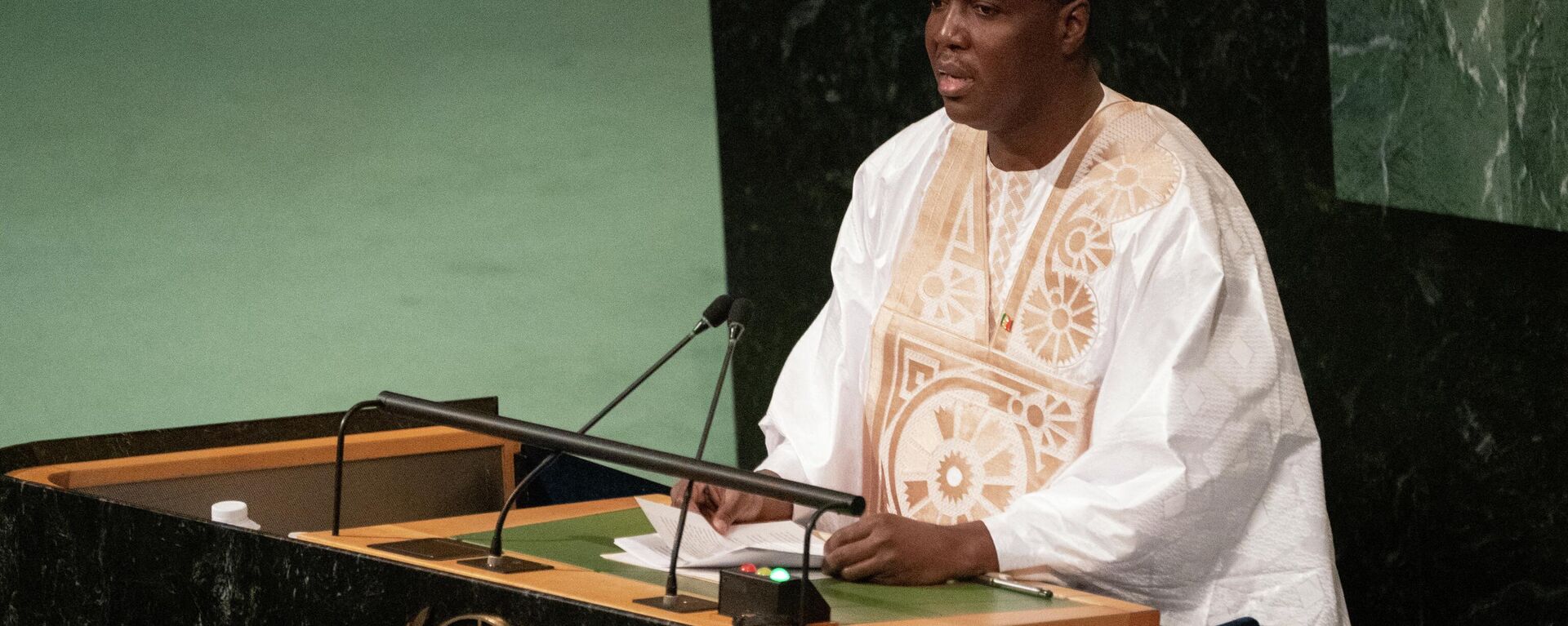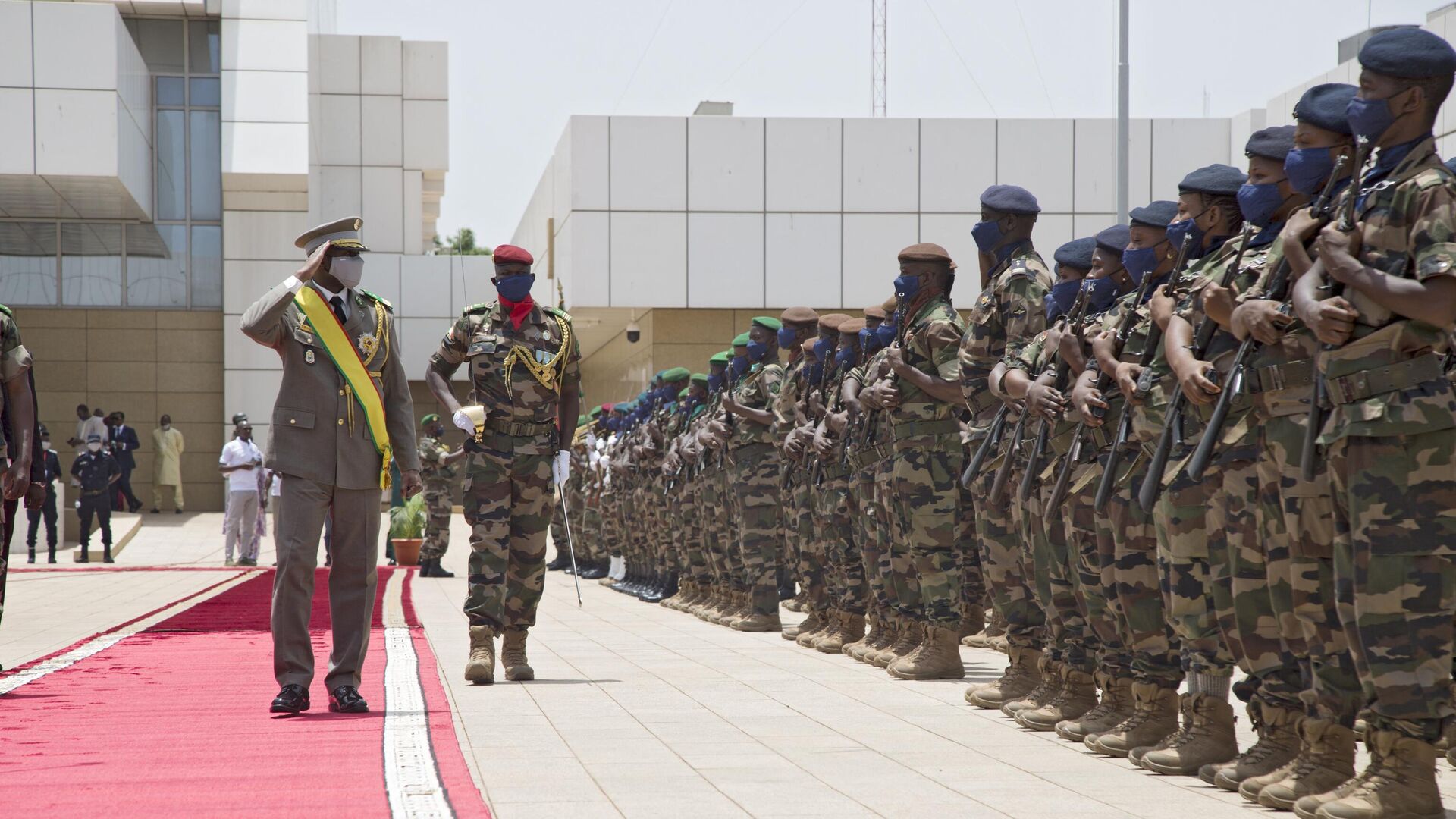https://sputnikglobe.com/20230115/mali-introduces-patriotic-day-as-symbol-of-resistance-to-external-sanctions-1106335476.html
Mali Introduces 'Patriotic Day' as Symbol of Resistance to External Sanctions
Mali Introduces 'Patriotic Day' as Symbol of Resistance to External Sanctions
Sputnik International
Mali’s transitional government has introduced the new "National Day of Patriotic Sovereignty" on Saturday as a display of the country’s independence in the face of external pressure.
2023-01-15T08:58+0000
2023-01-15T08:58+0000
2023-01-15T08:58+0000
africa
west africa
mali
transitional government
sovereignty
patriotism
national day
https://cdn1.img.sputnikglobe.com/img/07e7/01/0f/1106335302_0:0:3073:1728_1920x0_80_0_0_837b8ce3ffb5bea7ea964d4d89807a89.jpg
Mali’s transitional government introduced the new National Day of Patriotic Sovereignty on Saturday as a display of the country’s independence in the face of external pressure, the Ministry of Foreign Affairs said in a statement. On January 6, the country’s Council of Ministers decided to establish January 14 the "National Day of Patriotic Sovereignty" as a symbol of the great and patriotic mobilization of Malians against the "illegal, illegitimate and inhuman sanctions" imposed by ECOWAS (Economic Community of West African States) and UEMOA (West African Economic and Monetary Union).The National Day of Patriotic Sovereignty is supposed to commemorate the events of January 2022, when Malians protested against restrictive measures imposed on the country. According to the government, millions of Malians then mobilized in the country and abroad, voicing their frustration over the sanctions. The measures were introduced by the regional bodies in response to the military's plan to stay in power for up to five more years. The military, which first took power in a 2020 coup, originally pledged to hold elections in February of 2022. However, the sanctions were lifted after the government announced a new election timetable in June 2022, with general elections scheduled for 2024.Ahead of the holiday, on January 13, 2023, Mali's Minister of Foreign Affairs and International Cooperation Abdoulaye Diop attended the presentation of a model lesson in one of Bamako's schools. The lesson was dedicated to the National Day of Patriotic Sovereignty and included discussions on understanding the concepts of the motherland, patriotism, defense of the nation, sovereignty and its symbols, as well as the ECOWAS and UEMOA sanctions and their impact on Mali. According to the Ministry of Foreign Affairs, such lessons were held in all schools across the country and were aimed at "strengthening the patriotic feeling" among students. The authorities initially planned to hold a public rally on Saturday in Bamako, but decided to postpone it, citing security reasons. A government-sponsored rally in Mali's capital Bamako took place on January 14 last year as thousands of people protested regional economic sanctions, as well as growing pressure from former colonizer France. Mali has repeatedly stated that it is facing severe external pressure. In particular, it has accussed France of undermining the country's security. Last year, a wave of anti-French protests swept Africa's Sahel region, with many protesters expressing pro-Russian sentiments, as Paris started to withdraw its troops after experiencing military setbacks in countering security threats.
https://sputnikglobe.com/20220925/malis-prime-minister-praises-russia-denounces-france-at-unga-1101194363.html
africa
west africa
mali
Sputnik International
feedback@sputniknews.com
+74956456601
MIA „Rossiya Segodnya“
2023
News
en_EN
Sputnik International
feedback@sputniknews.com
+74956456601
MIA „Rossiya Segodnya“
Sputnik International
feedback@sputniknews.com
+74956456601
MIA „Rossiya Segodnya“
west africa, mali, transitional government, "national day of patriotic sovereignty", ecowas, sanctions, france
west africa, mali, transitional government, "national day of patriotic sovereignty", ecowas, sanctions, france
Mali Introduces 'Patriotic Day' as Symbol of Resistance to External Sanctions
The West African ECOWAS bloc imposed economic and financial sanctions against Mali's transitional government in January last year after military leaders delayed elections until 2026. The sanctions were highly criticized by the government, and sparked waves of condemnation among the Malian people, who suffered the most from the restrictions.
Mali’s transitional government introduced the new National Day of Patriotic Sovereignty on Saturday as a display of the country’s independence in the face of external pressure, the Ministry of Foreign Affairs said in a statement.
On January 6, the country’s Council of Ministers decided to establish January 14 the "National Day of Patriotic Sovereignty" as a symbol of the great and patriotic mobilization of Malians against the "illegal, illegitimate and inhuman sanctions" imposed by ECOWAS (Economic Community of West African States) and UEMOA (West African Economic and Monetary Union).
The National Day of Patriotic Sovereignty is supposed to commemorate the events of January 2022, when Malians protested against restrictive measures imposed on the country. According to the government, millions of Malians then mobilized in the country and abroad, voicing their frustration over the sanctions.
The measures were introduced by the regional bodies in response to the military's plan to stay in power for up to five more years. The military, which first took power in a 2020 coup, originally pledged to hold elections in February of 2022.
However, the sanctions were lifted after the government announced a new election timetable in June 2022, with general elections scheduled for 2024.
Ahead of the holiday, on January 13, 2023, Mali's Minister of Foreign Affairs and International Cooperation
Abdoulaye Diop attended the presentation of a model lesson in one of Bamako's schools. The lesson was dedicated to the National Day of Patriotic Sovereignty and included discussions on understanding the concepts of the motherland, patriotism, defense of the nation, sovereignty and its symbols, as well as the ECOWAS and UEMOA sanctions and their impact on Mali.
According to the Ministry of Foreign Affairs, such lessons were held in all schools across the country and were aimed at "strengthening the patriotic feeling" among students. The authorities initially planned to hold a public rally on Saturday in Bamako, but decided to postpone it, citing security reasons.
A government-sponsored rally in Mali's capital Bamako took place on January 14 last year as thousands of people protested regional economic sanctions, as well as growing pressure from former colonizer France. Mali has repeatedly stated that it is facing severe
external pressure. In particular, it has accussed France of undermining the country's security.
Speaking at the UN General Assembly, Mali's Prime Minister Abdoulaye Maiga denounced France for its "neocolonial, condescending, paternalistic and revanchist practice," blaming France for sponsoring the sanctions of ECOWAS and UEMOA against the country.
Last year, a wave of anti-French protests swept Africa's Sahel region, with many protesters expressing
pro-Russian sentiments, as Paris started to withdraw its troops after experiencing military setbacks in countering security threats.

25 September 2022, 11:31 GMT



